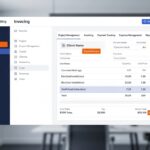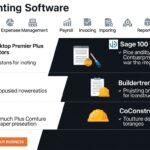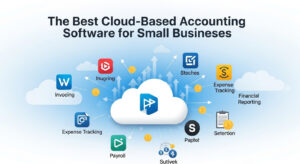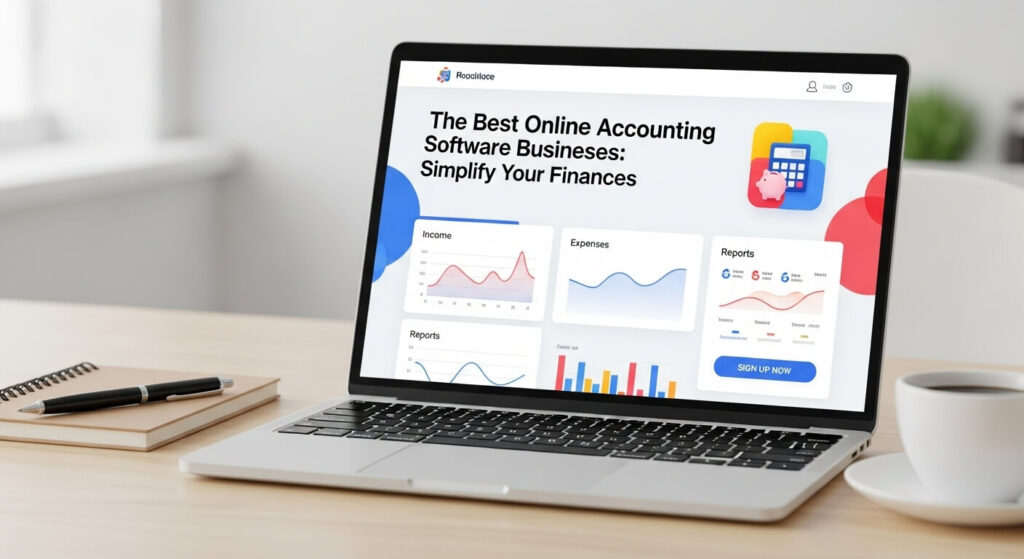
The Best Online Accounting Software for Small Businesses : Simplify Your Finances
Running a small business is a constant juggle. You’re busy making sales, serving customers, and growing your brand. Often, the tricky part of managing money takes a backseat. Many business owners feel stuck handling piles of receipts, dealing with confusing tax rules, or fearing a simple mistake could cost them big. It takes a lot of precious time and can cause real stress.
What if there was an easier way? Modern online accounting software steps in as a smart solution to these headaches. This kind of tool helps you automate everyday money tasks, making them quick and simple. You can check your business finances from anywhere, anytime. Using the best online accounting software for small business means clearer financial pictures. This helps you make better choices for your company’s future. It turns complex “small business accounting” into something you can handle with confidence.
Why Online Accounting Software is Crucial for Small Businesses
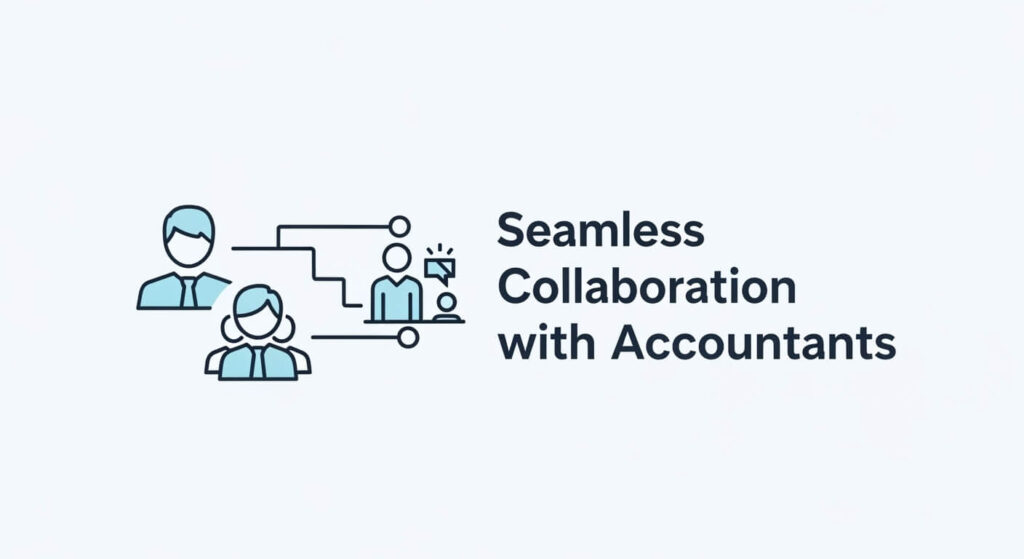
Using online accounting software can truly change how you run your business. It takes away many of the boring, time-consuming parts of handling money. Think of it as a helpful assistant that works around the clock. This frees you up to focus on what you do best: growing your company.
Streamlining Financial Operations
Cloud-based accounting tools make daily money tasks much smoother. They cut down on manual work, which gives you back valuable hours each week. You will find more time for your customers and new business ideas. This means less time staring at spreadsheets and more time for actual work.
Automation of Invoicing and Billing
Sending invoices used to be a chore. Now, your accounting software can send recurring bills automatically. It even sends friendly reminders to clients who might be late paying. You can also let customers pay directly online. This makes getting paid quicker and easier for everyone involved.
Effortless Expense Tracking and Management
Say goodbye to messy piles of receipts. With online accounting software, you can snap a photo of a receipt with your phone. The software then adds it to your records. It connects to your bank accounts, pulling in all your transactions. This way, you easily sort and label every business cost.
Real-time Financial Reporting
Imagine knowing your business’s financial health at any moment. Online tools give you live reports. You can see your profit and loss, balance sheets, and cash flow right away. These clear reports help you understand where your money goes. They help you make smart choices for your company’s path ahead.
Enhancing Accuracy and Compliance
Human errors can be costly for any small business. Accounting software helps to keep mistakes to a minimum. It helps you follow tax rules, which saves you stress and possible fines. Your records stay neat and correct.
Reducing Data Entry Errors
Linking your bank to your software means fewer typos. The system pulls in transactions directly. It then helps you match them to your records. This cuts down on manual data entry, making your books more exact.
Simplified Tax Preparation
Tax season can feel like a mountain of paperwork. Your accounting software collects all the needed data throughout the year. It can create reports that make filing your taxes much easier. Some even link up with popular tax preparation programs.
Improved Audit Readiness
Having well-organized digital records is a big help if you ever face an audit. All your financial details are stored in one safe place. This makes it simple to show auditors exactly what they need to see. You can quickly find any transaction or report.
Key Features to Look for in Small Business Accounting Software
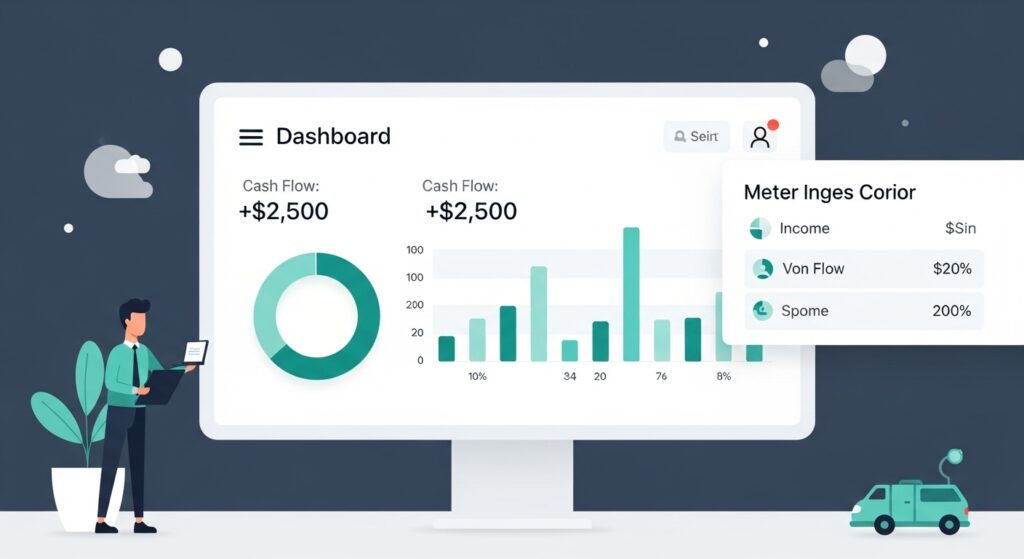
When picking the best online accounting software for your small business, some features are a must-have. Think about what your business needs most. A good tool simplifies your money life.
Core Accounting Functionality
This section covers the basic parts every solid accounting program should have. These are the tools that make managing your finances actually work. You simply cannot do without these core functions.
- Chart of Accounts Management: This is like the backbone of your financial system. It helps you sort all your money into categories. This makes it easy to see where money comes from and where it goes.
- Bank Reconciliation: This feature helps you match your bank statements to your own records. It makes sure every dollar in your account is accounted for. This process catches any missing payments or errors fast.
- Accounts Payable and Receivable: You need to keep track of money you owe (payables) and money owed to you (receivables). This part of the software helps you manage bills you need to pay. It also tracks customer invoices waiting to be collected.
User-Friendliness and Accessibility
Most small business owners are not expert accountants. So, the software needs to be easy to use. If it’s too complicated, you won’t use it. Simplicity is key for busy entrepreneurs.
- Intuitive Interface Design: Look for a clean and simple main screen. You should be able to find what you need quickly. Easy navigation saves you time and frustration.
- Mobile App Availability: Life on the go calls for mobile access. A good app lets you manage money tasks from your phone or tablet. You can send invoices or check expenses anywhere.
- Customer Support and Resources: When you hit a snag, help should be easy to find. Good software offers clear guides, videos, and responsive customer service. This keeps you from getting stuck.
Scalability and Integrations
Your business will grow, and your software should grow with it. It also needs to play nice with other tools you use. The right choice supports your future and fits into your current workflow.
- Integration with Other Business Tools: Many small businesses use other apps. Your accounting software should link to things like your customer database (CRM). It should also work with payroll, online stores, or project managers.
- Ability to Handle Growth: As your business gets bigger, you’ll have more transactions and maybe more staff. The software should handle this increased load. It should also let more people access it as needed.
- Multi-currency Support (if applicable): If you deal with customers or suppliers in other countries, this feature is a must. It lets you handle different currencies easily. This helps make international business simpler.
Top Online Accounting Software Options for Small Businesses
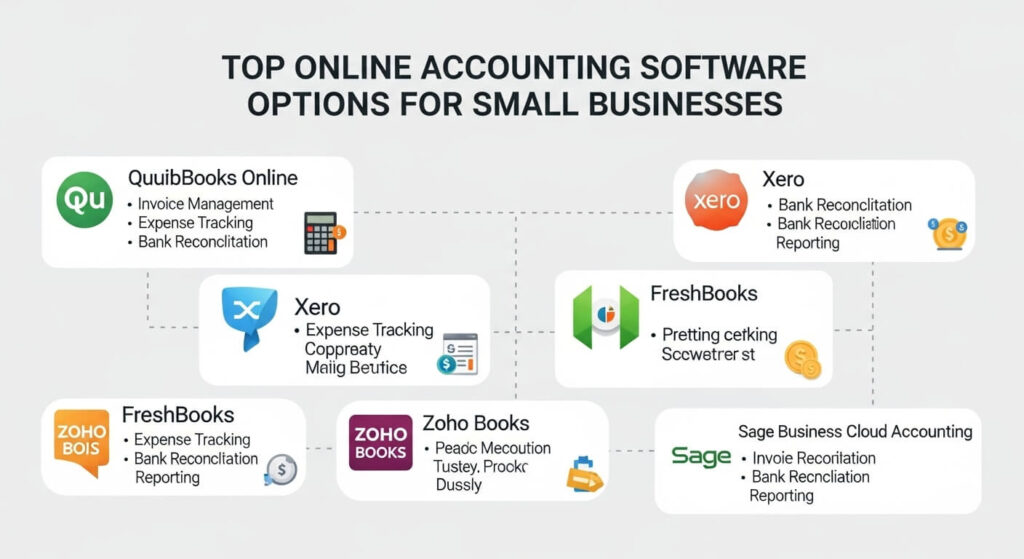
Choosing the right tool can feel overwhelming. Here are some of the best online accounting software options for small business owners today. We look at what each one offers.
1: QuickBooks Online
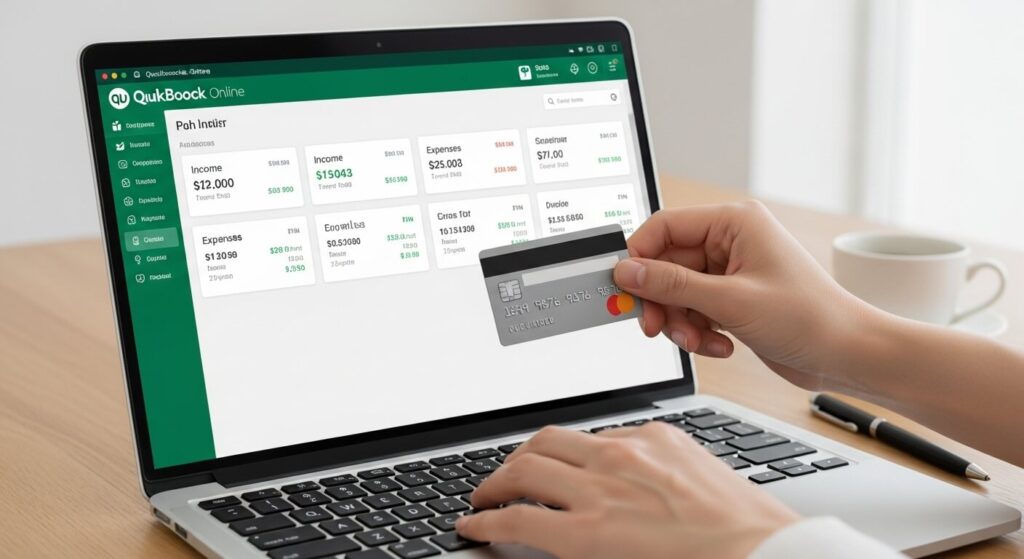
QuickBooks Online is perhaps the most well-known accounting tool. It serves a huge range of small businesses. Its strength lies in its wide feature set and ease of use for many tasks. It helps you keep all your financial records in one spot.
- Key Features and Benefits: QuickBooks Online offers strong invoicing and expense tracking. It has a great mobile app for on-the-go work. You can link your bank accounts for automatic updates. Plus, it offers detailed financial reports to understand your money. Payroll services are also built in, making employee payments easy.
- Pricing and Plans: Plans vary from simple tools for freelancers to full-featured options for growing businesses. Costs go up with more users and advanced features. You can often try it for free for a short time.
- Who is it Best For? This software is great for most small businesses, especially those that need strong reporting. It works well if you plan to hire employees or need many integrations. Many accountants also know QuickBooks, which helps with collaboration.
2: Xero

Xero is a popular choice known for its user-friendly design. It often feels more modern and fresh than some older systems. Xero is cloud-based, so you can use it from any device. It’s especially loved by creative and tech-focused small businesses.
- Key Features and Benefits: Xero provides good bank reconciliation and easy invoicing. Its dashboard gives a clear view of your cash flow. It also offers powerful multi-currency support. This is a big plus for businesses with global customers. Xero connects with hundreds of other apps.
- Pricing and Plans: Xero offers different plans based on your business size and needs. Starter plans limit the number of invoices and bills you can send. Higher tiers offer unlimited transactions and more features.
- Who is it Best For? Xero is an excellent fit for small businesses that value ease of use and a clean look. It’s perfect for those with international dealings. Businesses seeking a strong community and many integrations will find Xero useful.
3: FreshBooks
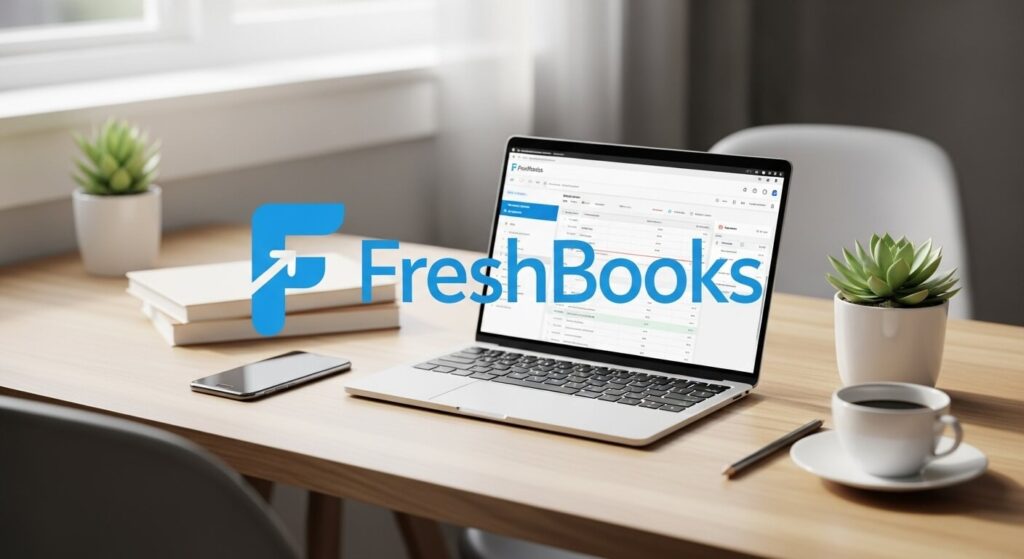
FreshBooks focuses on service-based small businesses and freelancers. It makes invoicing, time tracking, and expense management very simple. If you bill clients by the hour or by project, FreshBooks might be your best bet. It tries to make your client-facing work easy.
- Key Features and Benefits: FreshBooks shines with its custom invoice templates and online payment options. Its time tracking feature lets you log hours easily to bill clients accurately. You can also send professional proposals and collect client feedback.
- Pricing and Plans: FreshBooks has plans scaled for different numbers of active clients. As your client list grows, you might need a higher-tier plan. They also offer a 30-day free trial to test it out.
- Who is it Best For? Freelancers, consultants, agencies, and any service-based small business will love FreshBooks. If sending professional invoices and tracking billable hours is a core part of your work, this tool is ideal.
4: Zoho Books
Zoho Books is part of the larger Zoho suite of business tools. It offers a powerful set of accounting features at a very competitive price. It’s a great choice for small businesses looking for robust features without breaking the bank. It provides strong value.
- Key Features and Benefits: Zoho Books includes invoicing, expense tracking, and bank reconciliation. It offers project time tracking and inventory management. You can also manage your contacts and create customer portals. It has robust reporting capabilities.
- Pricing and Plans: Zoho Books offers various pricing tiers, including a free plan for very small businesses. Paid plans are budget-friendly and add features like multi-currency support and more users.
- Who is it Best For? Small businesses that want a feature-rich solution at a good price point should look at Zoho Books. It’s especially useful if you already use other Zoho products. It also suits businesses needing project tracking or basic inventory.
5: Sage Business Cloud Accounting
Sage Business Cloud Accounting provides clear, simple online accounting. It aims to help small businesses stay on top of their money with less fuss. It’s a reliable option with a long history in accounting software. It keeps things easy.
- Key Features and Benefits: This software offers simple invoicing, expense recording, and bank account linking.
- It includes basic inventory tracking. You can create easy-to-read financial reports. It also handles sales tax calculations.
- Pricing and Plans: Sage offers a few plans, usually starting with simpler invoicing and expense tracking. Higher plans include more complex features like full bank reconciliation and cash flow forecasts. They usually offer a free trial.
- Who is it Best For? Small businesses that need straightforward accounting without too many bells and whistles will like Sage. It’s good for businesses that want a reliable name in accounting. It’s simple enough for new business owners.
Making the Right Choice: Factors to Consider
Picking the right accounting software for your small business means thinking about a few key things. It’s not a one-size-fits-all decision. Your business is unique.
Budget and Value
Cost is always a factor, but the cheapest option isn’t always the best. You need to balance what you pay with what you get. The goal is real value for your money.
- Understanding Subscription Costs: Most online accounting tools charge a monthly or yearly fee. Look closely at what each plan includes. Watch out for possible hidden fees, like extra charges for more users or advanced features.
- ROI of Accounting Software: Think about how the software saves you time and reduces mistakes. These savings can quickly outweigh the monthly cost. It’s an investment that helps your business run better.
- Free Trials and Demos: Always try out software before you commit. Most providers offer free trials or online demos. This lets you see if the features work for your business before you pay.
Specific Business Needs
Your business is different from others. The software you choose should fit your specific way of working. What works for one company might not work for another.
- Industry-Specific Features: Some businesses have unique needs. A restaurant might need strong inventory tracking. A construction company might need job costing. Look for software that caters to your industry’s special demands.
- Number of Users and Transaction Volume: How many people need to access your accounting system? How many sales or expenses do you have each month? These numbers affect which software plan you need and how much it costs.
- Integration Requirements: Think about the other business tools you already use. Does your chosen accounting software connect smoothly with them? Good integration makes your entire workflow much more efficient.
Expert Tips for Maximizing Your Accounting Software
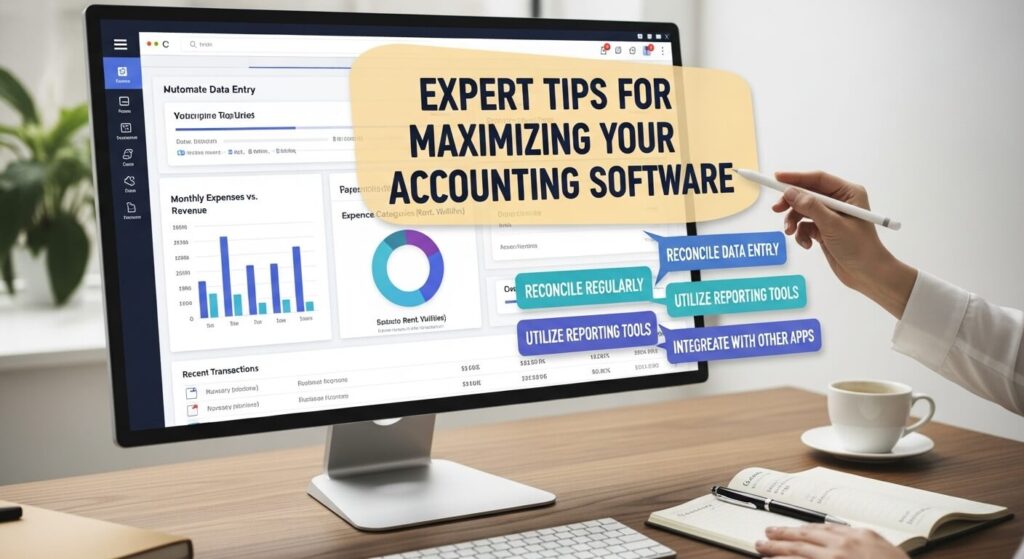
Once you pick your software, how do you get the most out of it? Following some smart habits will help you use it to its full potential. Make your new tool a true asset.
Implementing Best Practices
Using your software effectively means setting up good routines. These simple steps ensure your financial data stays clean and useful. Stay on top of your money tasks.
- Regular Data Backups and Security: Even cloud software needs your attention. Always use strong passwords and two-factor authentication. Understand how your provider protects your data.
- Consistent Bookkeeping Habits: Don’t let tasks pile up. Spend a little time each week reviewing transactions. Reconcile your bank accounts monthly. This keeps your records accurate and easy to manage.
- Utilizing Reporting Features: Don’t just enter data. Look at your reports often. They can show you important trends in your business. This helps you spot problems or new opportunities.
Seeking Professional Advice
Sometimes, you need a little extra help. Knowing when to bring in an expert can save you trouble down the road. They can make your software work even harder for you.
- When to Hire a Bookkeeper or Accountant: If your finances get complex, consider getting professional help. A bookkeeper can handle daily tasks. An accountant can give tax advice and financial strategy.
- Leveraging Accountant Access: Most online accounting software lets you invite your accountant. They can log in directly to your books. This makes working together much smoother and faster.
Conclusion
Choosing the best online accounting software for small business owners is a vital step. It helps you take charge of your money, save time, and avoid costly mistakes. These powerful tools offer automation, accuracy, and insights. They turn tricky “small business accounting” into a manageable part of your day.
Ready to simplify your financial management? Take a closer look at the options discussed. Pick the software that best fits your business needs and budget. Start exploring those free trials today. Take control of your finances and set your small business up for success.

